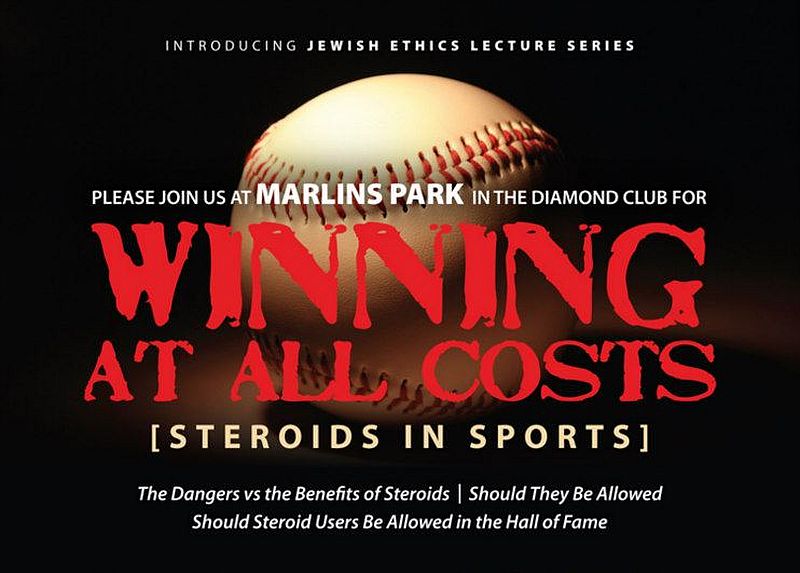
The South Florida Center for Jewish Ethics addressed the issue of anabolic steroids and performance-enhancing drugs (PEDs) in sport during a lecture entitled “Winning at all Costs: Steroids in Sports” at Marlins Park in Miami on January 17, 2013. The timing of the lecture coincided with Lance Armstrong’s prime-time television admission on the Oprah Winfrey Network that he used erythropoietin (EPO) and testosterone throughout his career.
Rabbi Chaim Friedman and Rabbi David Schoen examined the steroid issue from a Jewish perspective informed by relevant areas of the Torah and Talmud. The lecture included a discussion of the dangers versus the benefits of steroids and their use in professional sports. The lecture promised to help attendees differentiate between a secular and a Jewish view of steroids.
“If a person wanted to be injected with steroids in order to perform better in athletics and to go through the therapy in order to perform better, that is certainly not covered by the license of the Talmud and you wouldn’t be allowed to do it,” Friedman said.
Friedman based the incompatibility between anabolic steroid use and Jewish law on the alleged unhealthy nature of these performance-enhancing drugs. Since Jewish law does not grant an individual permission to do whatever harm he wants to his body, steroids are not permitted.
Friedman interpretation is based on his assumption that anabolic steroids are invariably “harmful”. As readers of MESO-Rx are well aware, many of the dangers of steroids are overstated and exaggerated. Many steroid experts believe that steroids can be used safely for bodybuilding and performance-enhancing purposes under controlled medical supervision. How would Friedman modify his interpretation if (1) the use of steroids could be proven to be safe under certain circumstances or (2) the use of steroids that are entirely free of side effects are developed in the future?
Rabbi Schoen provided two additional reasons specific to why professional athletes are not allowed to use steroids under Jewish law. Athletes who lie about their use of steroids are deceiving the public. In addition, such use is a form of stealing since they are (presumably) paid to perform naturally. If the athlete is not qualified to meet a certain level of achievement naturally, he is essentially stealing money from the team.
Schoen did acknowledge there may be hypothetical situations under which an athlete’s use of steroids may not be a problem. Specifically, this involved the requirement that an athlete must use steroids and PEDs to make a living because ‘everyone else is doing it’.
“If everyone is taking steroids or everyone thinks everyone is taking steroids then you can make an argument that maybe it’s not a problem but that doesn’t seem to be the case at least at this juncture,” Schoen said.
The use of performance-enhancing drugs is pervasive throughout professional sports. Most elite athletes seem to think that almost ‘everyone else is doing it.’ The general public is coming closer and closer to agreeing with that assessment with each successive doping scandal.

About the author
Millard writes about anabolic steroids and performance enhancing drugs and their use and impact in sport and society. He discusses the medical and non-medical uses of anabolic-androgenic steroids while advocating a harm reduction approach to steroid education.

Leave a Reply
You must be logged in to post a comment.